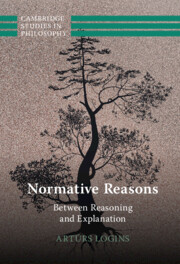Normative Reasons
Reasons matter greatly to us in both ordinary and theoretical contexts, being connected to two fundamental normative concerns: figuring out what we should do and what attitudes to have, and understanding the duties and responsibilities that apply to us. This book introduces and critiques most of the contemporary theories of normative reasons – considerations that speak in favour of an action, belief, or emotion – to explore how they work. Artūrs Logins develops and defends a new theory: the Erotetic view of reasons, according to which normative reasons are appropriate answers to normative ‘Why?’ questions (Why should I do this?). This theory draws on evidence of how ‘Why?’ questions work in informal logic, language, and philosophy of science. The resulting view is able to avoid the problems of previous accounts, while retaining all their attractive features, and it also suggests exciting directions for future research. This title is also available as Open Access on Cambridge Core.
Artūrs Logins is Swiss National Science Foundation Ambizione Fellow at the University of Zurich, Switzerland. He works in epistemology and foundational normative questions, and he has published papers in Philosophical Studies, Ethics, Analysis, Erkenntnis, European Journal of Philosophy, Thought, and Inquiry.



